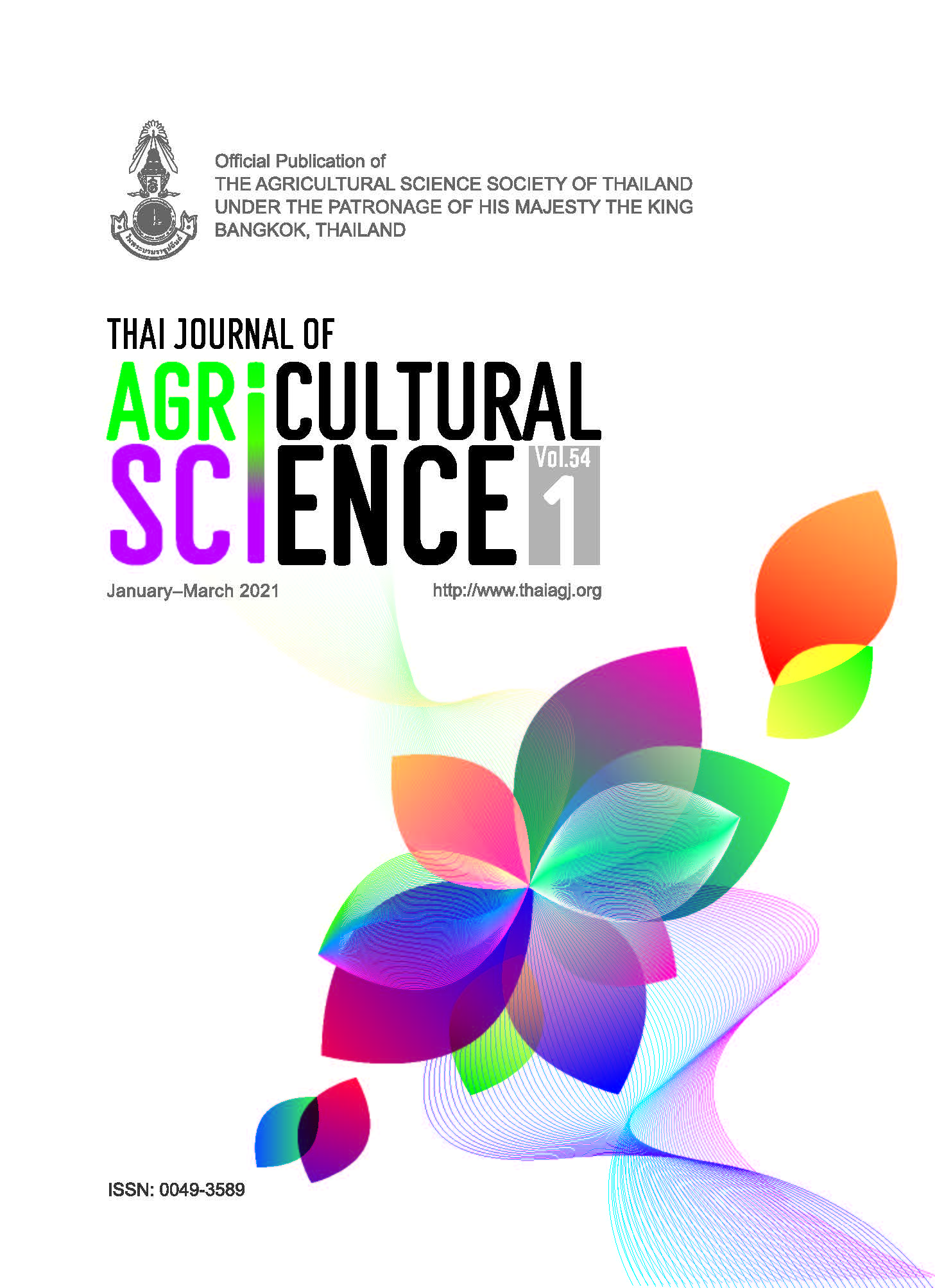Sustainability assessment of paddy farming system in Kaduwela wetland ecosystem in Sri Lanka
Main Article Content
Abstract
As a result of intensive agriculture, the number of worldwide natural wetlands are losing their biodiversity and unique characteristics. Kaduwela wetland ecosystem is such a natural wetland in Colombo district of Sri Lanka which has a long history of paddy farming. This study was carried out to assess the sustainability of this wetland paddy ecosystem while determining factors affecting paddy farmers’ adaptability for sustainable agricultural practices in the locality. A household questionnaire survey was conducted in 2019 for 100 randomly selected paddy farmers in the Dedigamuwa Grama Niladhari Division to collect data. Both qualitative and quantitative methods were used for data analysis. Thirteen different indicators were developed to assess economic, social, and environmental sustainability, and then economic efficiency index (EEI), social security index (SSI), and environmental security index (ESI) were derived which were used to calculate the total sustainability index (TSI). Multiple linear regression was used to identify the factors affecting paddy farmers’ adaptability for sustainable agricultural practices. Results revealed that only 3% of the farmers are sustainable (TSI ≥ 0.5) while 97% (TSI < 0.5) are vulnerable. Furthermore, profitability from paddy farming (0.0001 ± 0.0000; p = 0.007), education level of the farmers (0.6552 ± 0.2063; p = 0.002), frequency of extension services (1.6809 ± 0.7713; p = 0.031), women participation in farming (5.6694 ± 2.7946; p = 0.045) and paddy farming experience (0.4746 ± 0.1061; p = 0.0026) positively influenced while hired labours per acre per season (–0.2905 ± 0.0937; p < 0.0001) negatively influenced on the adaptability of sustainable agricultural practices by the paddy farmers. The results of this study reported decreasing the cost of production, using resource– conserving practices, and improving technologies, increasing information availability and accessibility as the major factors that are vital to promoting sustainability in this wetland–paddy ecosystem. The study also suggests the need for government support and intervention in agricultural advisory services as an engine to promote sustainable agricultural practices while conserving unique characteristics of Kaduwela wetland paddy ecosystems in Sri Lanka.
Article Details
References
Bambaradeniya, C.N.B. 2003. An overview of irrigated rice agro-ecosystems in Asia as man–made wetlands sustaining rich biodiversity. Int. J. Ecol. Environ. Sci. 29: 29–38.
Bond, A., A. Morrison–Saunders and J. Pope. 2012. Sustainability assessment: the state of the art. Impact Assess. Proj. Apprais. 30(1): 53–62.
Campbell, B.M., P. Bradley and S.E. Carter. 1997. Sustainability and peasant farming systems: observations from Zimbabwe. Agric. Human Values. 14: 159–168.
Daryaei, N. 2014, Factors affecting rice farmer’s knowledge about the principles of sustainable agriculture (case study: central part of Noor township in the Mazandaran province, Iran). Sci. J. Crop Sci. 3(4): 32–36.
Frenken, K. and I. Mharapara. 2002. Wetland Development and Management in SADC Countries. In: Proceedings of an FAO Sub–regional Workshop. Harare, Zimbabwe.
Hayati, D., Z. Ranjbar and E. Karami. 2010. Measuring agricultural sustainability, pp. 73–100. In: E. Lichtfouse, (Ed.), Biodiversity, Biofuels, Agroforestry and Conservation Agriculture. Sustainable Agriculture Reviews. Vol. 5. Springer, Dordrecht.
IUCN (International Union for Conservation of Nature). 2018. Wetland ecosystems. Available Source: https://www.iucn.org/commissions/commission-ecosystem-management/our-work/cems-specialist-groups/wetland-ecosystems.
Kawano, S. 2000. Nakaikemi, a miraculous lowland marsh in central Honshu, Japan: a search for the secret of its fascination. The Nakaikemi Wetland Trust, Japan.
Lee, S., T. Nguyen, P. Poppenborg, H. Shin and T. Koellner. 2016. Conventional, partially converted and environmentally friendly farming in South Korea: profitability and factors affecting farmers’ choice. Sustainability 8(8): 704.
Lefroy, R.D.B., H.D. Bechstedt and M. Rais. 1999. Indicators for sustainable land management based on farmer surveys in Vietnam, Indonesia and Thailand. Agric. Ecosyst. Environ. 81(2): 137–146.
Mgbada, J., D. Ohajianya and E. Nzeh. 2016. Sustainable agricultural practices and its determinants in South–East Nigeria. J. Adv. Agric. Technol. 3(3): 170–174.
Mishra, B., B. Gyawali, K. Paudel, N. Poudyal, M. Simon, S. Dasgupta and G. Antonious. 2018. Adoption of sustainable agriculture practices among farmers in Kentucky, USA. Environ. Manag. 62(6): 1060–1072.
Nazir, H., S. Kharkwal, D. Bardhan, S.C. Tripathi and A. Kumar. 2017. Sustainability assessment of dairy production systems in Uttarakhand hills of India. Int. J. Pure App. Biosci. 5(2): 215– 229.
Rasul, G. and G.B. Thapa. 2003. Sustainability analysis of ecological and conventional agricultural systems in Bangladesh. World Dev. 31(10): 1721–1741.
Roy, R., N. Chan and R. Rainis. 2013. Rice farming sustainability assessment in Bangladesh. Sustain. Sci. 9(1): 31–44.
Seifollahi–Aghmiuni, S., M. Nockrach and Z. Kalantari. 2019. The potential of wetlands in achieving the sustainable development goals of the 2030 Agenda. Water 11: 609.
Shimoda, M. 2007. Conservation and management of rice field biodiversity, pp. 323–329. In: T. Okruszko, E. Maltby, J. Szatylowicz, D. Miroslaw–Swiatek and V. Kotowski, (Eds.), Wetlands: Monitoring, Modelling and Management. Taylor and Francis, London, UK.
Taylor, D.C., Z.A. Mohamed, M.N. Shamsudin, M.G. Mahayidin and E.F.C. Chiew. 1993. Creating a farmer sustainability index: a Malaysian case study. Am. J. Alternative Agric. 8: 175–184.
Vanloon, G.W., S.G. Patil and L.B. Huger. 2005. Agricultural Sustainability: Strategies for Assessment. SAGE Publications India Pvt. Ltd., New Delhi, India.
Verheem, R. 2002. Recommendations for sustainability assessment in the Netherlands. In: Netherlands Commission for EIA, (Eds.), Environmental Impact Assessment in the Netherlands: Views from the Commission for EIA in 2002. The Netherlands.


